Blog

How To Discover Promising Investment Properties: Your Essential Guide
"Unlock the door to your financial future!" Finding the right investment property can be the gateway to building wealth, but knowing where to look is key.
Whether you're a novice or seasoned investor, our guide simplifies the journey to finding your next lucrative real estate investment.
Step-by-Step Guide to Finding Investment Properties
1. Define Your Investment Goals
Purpose: Decide whether you're investing for cash flow, appreciation, or both.
Risk Tolerance: Determine how much risk you are willing to take.
Financial Planning: Assess your budget and consider future expenses, such as property maintenance and taxes.
2. Research the Market
Location Analysis: Look for areas with rising property values, good schools, and robust employment rates.
Economic Indicators: Pay attention to local economic developments, such as new employers entering the area or government infrastructure projects.
3. Utilize Online Resources
Real Estate Platforms: Websites like Zillow, Realtor.com and Redfin can provide valuable insights into market trends and pricing.
Public Records: Check local government websites for property tax information, zoning laws, and future development plans.
4. Network with Professionals
Real Estate Agents: They can offer valuable insights and access to off-market deals.
Local Investors: Join real estate investment groups or forums to learn from experienced investors.
5. Consider Different Property Types
Residential Properties: These can range from single-family homes to multi-unit dwellings.
Commercial Real Estate: Includes office spaces, retail locations, and industrial properties.
Specialty Properties: Such as REITs (Real Estate Investment Trusts) or crowdfunding opportunities.
Frequently Asked Questions (FAQs)
Q1: What makes a good investment property?
A good investment property typically offers a combination of positive cash flow, potential for appreciation, and manageable levels of risk. Properties in areas with strong rental demand and growth potential are often desirable.
Q2: How much should I budget for unexpected expenses?
It's wise to budget at least 20-30% of your monthly rental income for unexpected expenses, including maintenance and vacancy periods.
Q3: Is it better to invest locally or out of state?
Local investments allow for easier management and hands-on control, but out-of-state properties can offer higher returns if chosen wisely. Consider your ability to manage the property from a distance.
Q4: How do I calculate the return on investment (ROI) for a property?
ROI can be calculated by dividing the annual return by the total investment cost. Include all revenue sources and subtract all expenses, including mortgage payments.
Q5: What are the risks of property investment?
Risks include unexpected repairs, vacancy periods, and fluctuating market conditions. Proper research and a well-considered strategy can mitigate these risks.
Conclusion:
Investing in real estate is a proven pathway to wealth accumulation, but it requires careful planning and informed decision-making. By following these steps and continuously educating yourself, you'll enhance your ability to spot high-potential investment properties and make smart, lucrative decisions.
Optimized with clear, accessible language and structured for easy navigation, this guide aims to empower you with the knowledge you need to succeed in the competitive world of real estate investing.
RP Capital Lending is a d.b.a of RP Capital Partners Inc (NMLS # 2469193) | Privacy Policy
Copyright © 2022. All Rights Reserved.
Disclaimer: Loans only apply to non-owner occupied properties. Rates, terms and conditions offered only to qualified borrowers, may vary upon loan product, deal structure, other applicable considerations, and are subject to change at any time without notice.

